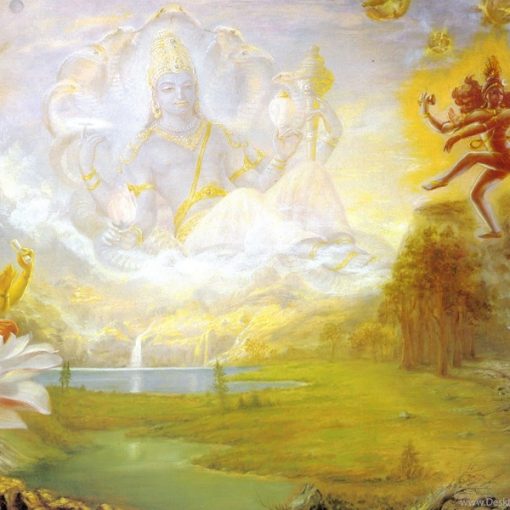Finding True Shelter in the Knowledge of the Self”
In our material lives, we often seek security and happiness through family, wealth, and status, believing these “soldiers” will protect us from life’s inevitable challenges. However, Srimad Bhagavatam (2.1.4) reveals a profound truth: the strength we place in these worldly attachments is ultimately fragile, and our material shelters are transient. This verse calls us to examine the fleeting nature of our worldly attachments and to discover the deeper, spiritual security that lies beyond them.
The Illusion of Security: Dependence on Fallible “Soldiers”
The SB 2.1.4 states:
“Persons devoid of ātma-tattva do not inquire into the problems of life, being too attached to the fallible soldiers like the body, children, and wife. Although sufficiently experienced, they still do not see their inevitable destruction.”
Material life often revolves around building a sense of security. We invest our time and energy in relationships, careers, and possessions, creating a sense of permanence in a world that is inherently impermanent. These attachments—body, family, society—are seen as soldiers in our fight against the unknown and inevitable, such as aging, illness, and death. Yet, as Srimad Bhagavatam explains, these “soldiers” are fallible. Despite our faith in them, they ultimately cannot save us from life’s final challenges.
The World of Death: Recognizing the Nature of Material Existence
The purport further elaborates on the nature of our struggle. This material world is called the “world of death,” as every living entity, from the mightiest to the smallest, is subject to decay and destruction. The human experience is marked by a struggle for survival in a realm where no one—neither kings, nor sages, nor common people—escapes the fate of death.
Despite witnessing the passing of our ancestors and seeing the impermanence of others’ lives, we tend to ignore this reality, clinging instead to the hope that our bodies, relationships, and possessions will last. The Bhagavatam cautions us against such ignorance and encourages us to look beyond this temporary existence to uncover our true, spiritual nature.
The Tragic Misuse of Human Life
Human life, a rare and precious opportunity, offers the chance to attain atma-tattva, the knowledge of the self. Yet, by overly identifying with the body and its connections, we waste this opportunity. Śukadeva Gosvāmī, in his teachings, urges us to recognize that our efforts to decorate and protect the material body are ultimately futile—like “decorating a dead body.”
All material achievements and advancements become mere decorations for something temporary. They offer no permanent fulfillment. When we place our hope in these external attachments, we become entangled in a cycle of worry, fear, and eventual disappointment.
The Bubble of Material Existence: A Dream of Temporary Realities
Our lives, filled with relationships and possessions, resemble bubbles in an ocean, fleeting and insubstantial. The great ocean of material nature, with its endless waves of time, constantly sweeps away all that we hold onto. The verse compares our lives to foaming bubbles that appear briefly and then vanish. Attachment to these fleeting bubbles blinds us to our eternal nature, leaving us vulnerable to the force of ignorance. This ignorance leads us to seek permanence in the impermanent, causing us to expend our energy in a “vain search after permanent living conditions, which are impossible in this material world.”
How to Break Free: Steps Toward Spiritual Security
- Self-Inquiry and Spiritual Reflection: The first step is to inquire into the true purpose of life and reflect on our nature as eternal souls. Asking questions such as “Who am I beyond my body and relationships?” and “What will remain with me after this life?” can shift our focus from temporary attachments to eternal truths.
- Detachment from the Temporary: While family, career, and possessions are part of life, the Bhagavatam encourages us to approach them with a sense of detachment, understanding that they are temporary by nature. This doesn’t mean abandoning responsibilities but cultivating an inner freedom that does not depend on them.
- Spiritual Practice and Sadhana: Engaging in regular spiritual practices—such as meditation, chanting, prayer, and study of scriptures—connects us with the eternal and builds resilience against the inevitable challenges of material life.
- Seek Shelter in God: True security comes not from fallible soldiers but from seeking refuge in the Supreme. By building a relationship with God, we find a source of strength, peace, and shelter that transcends all material limitations. This spiritual relationship is enduring and offers fulfillment that no material attachment can.
- Cultivate Compassionate Relationships: While the material aspect of relationships is temporary, the love and compassion we cultivate are eternal qualities. By fostering spiritually uplifting relationships based on compassion, service, and understanding, we elevate our connections to a divine level.
Embracing a New Vision of Life
The Bhagavatam calls us to awaken from the illusion that material achievements and relationships are the ultimate goals. When we look deeply into life, we see that true fulfillment comes from knowing our eternal nature and embracing a spiritual path. Instead of placing our hopes in transient “soldiers,” we can find peace in realizing that we are part of something far greater—an eternal spiritual reality.
Each person has the potential to rise above the limitations of material life, discovering a deeper purpose and lasting joy. Human life, when spent in pursuit of self-realization and in service to God and humanity, becomes a precious journey back to our spiritual home.
Conclusion: A Call to Seek the Eternal
The call of Srimad Bhagavatam is clear: do not be deceived by the temporary comforts of material attachments. Instead, seek the eternal shelter that lies within spiritual knowledge and God-consciousness. By embracing this wisdom, we can rise above the fleeting nature of material existence and find a sense of peace and fulfillment that transcends all worldly attachments.
Today, let us examine where we place our faith and consider redirecting our energy toward what truly endures. The journey begins with one simple question: Am I living for the eternal or the temporary? Answering this question and adjusting our priorities accordingly can transform our lives, freeing us from the cycle of fear and attachment and guiding us to the true, lasting shelter of spiritual knowledge.




